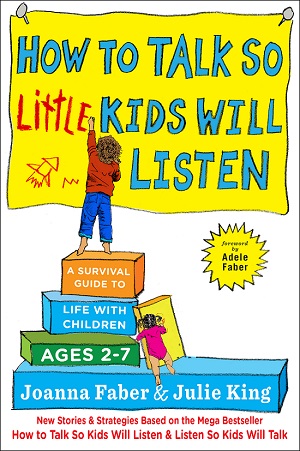Books & Apps
How To Talk So LITTLE Kids Will Listen: A Survival Guide to Life with Children Ages 2 – 7
by Joanna Faber and Julie King
With a Foreword by Adele Faber
#1 Best Seller on Amazon in the U.S. and Canada
We wrote this book for everyone who ever said to us, “I read How To Talk So Kids Will Listen & Listen So Kids Will Talk. But what do you do with a little kid who….?” Finish this sentence any way you like! Won’t brush her teeth. Pinches the baby. Screams in his carseat. Refuses to eat vegetables. Throws everything he can get his hands on. Normal, capable adults are often surprised by how quickly they can be brought to their knees by small people too young to drive a car — or tie their own shoes!
Young children inhabit their own special subcategory of humanity that combines a ferocious desire to actively modify their environment, with the energy of a tornado and the analytic skills of …well, a tornado. Truly the perfect storm.
It’s tough to be a little kid. It’s tough to be an adult responsible for that little kid. And it’s really tough to think about principles of communication when the baby’s crying, the toast is burning, the toddler is peeing in the potted plant, and the dog is running away with the diaper. It’s difficult to translate theory into action when you’re in the trenches, under fire.
That’s why we created this book. We review the skills of the original How To Talk book and then organize them into chapters arranged by the everyday challenges and conflicts we face with young children. What you get is a kind of emergency first aid manual of communication skills. Readers can flip directly to the chapter on getting out in the morning, or hitting, or grocery shopping, and find all the accumulated wisdom, stories and advice that we have collected over our years of running “How To Talk” workshops. We’ve also added a chapter that addresses the special needs of children who are wired differently – kids with sensory processing or autism spectrum disorders. You’ll find charming illustrations, cartoons, and reminder cards so that you can take in the skills at a glance when you don’t have much time.
These are the tools and tips that really work with little kids, and will make your day, whether at home, in the classroom or somewhere else in the world, more joyful and less stressful. And what’s more, they will lead to self-reliant big kids who are more cooperative and connected to their parents, teachers, siblings and peers.
